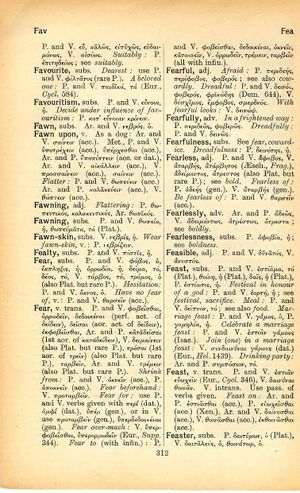feast: Difference between revisions
οὐχὶ σοῦσθ'; οὐκ ἐς κόρακας; οὐκ ἄπιτε; παῖε τῷ ξύλῳ → You will not go? The plague seize you! Will you not clear off? Hit them with your stick!
(Woodhouse 3) |
(CSV4) |
||
| Line 1: | Line 1: | ||
{{ | {{Woodhouse1 | ||
| | |Text=[[File:woodhouse_312.jpg|thumb|link={{filepath:woodhouse_312.jpg}}]]'''subs.''' | ||
P. and V. [[ἑστίαμα]], τό (Plat.). [[θοίνη]], ἡ (Plat.), δαῖς, ἡ (Plat.), P. [[ἑστίασις]], ἡ. | |||
<b class="b2">Festival in honour of a god</b>: P. and V. [[ἑορτή]], ἡ; see [[festival]], [[sacrifice]]. | |||
<b class="b2">Meal</b>: P. and V. [[δεῖπνον]], τό; see also [[food]]. | |||
<b class="b2">Marriage feast</b>: P. and V. [[γάμος]], ὁ, P. γαμηλία, ἡ. | |||
<b class="b2">Celebrate a marriage feast</b>: P. and V. ἑστιᾶν γάμους (<b class="b2">Isae.</b>). | |||
<b class="b2">Join</b> (<b class="b2">one</b>) <b class="b2">in a marriage feast</b>: V. συνδαινύναι γάμους (dat.) (Eur., ''Hel.'' 1439). | |||
<b class="b2">Drinking party</b>: Ar. and P. [[συμπόσιον]], τό. | |||
'''v. trans.''' | |||
P. and V. ἑστιᾶν εὐωχεῖν (Eur., ''Cycl.'' 346), V. δαινύναι θοινᾶν. | |||
V. intrans. Use pass. of verbs given. | |||
<b class="b2">Feast on</b>: Ar. and P. ἑστιᾶσθαι (acc.), P. εὐωχεῖσθαι (acc.) (Xen.), Ar. and V. δαίνυσθαι (acc.), V. θοινᾶσθαι (acc.), ἐκθοινᾶσθαι (acc.). | |||
}} | }} | ||
Revision as of 09:40, 21 July 2017
English > Greek (Woodhouse)
subs.
P. and V. ἑστίαμα, τό (Plat.). θοίνη, ἡ (Plat.), δαῖς, ἡ (Plat.), P. ἑστίασις, ἡ. Festival in honour of a god: P. and V. ἑορτή, ἡ; see festival, sacrifice. Meal: P. and V. δεῖπνον, τό; see also food. Marriage feast: P. and V. γάμος, ὁ, P. γαμηλία, ἡ. Celebrate a marriage feast: P. and V. ἑστιᾶν γάμους (Isae.). Join (one) in a marriage feast: V. συνδαινύναι γάμους (dat.) (Eur., Hel. 1439). Drinking party: Ar. and P. συμπόσιον, τό. v. trans. P. and V. ἑστιᾶν εὐωχεῖν (Eur., Cycl. 346), V. δαινύναι θοινᾶν. V. intrans. Use pass. of verbs given. Feast on: Ar. and P. ἑστιᾶσθαι (acc.), P. εὐωχεῖσθαι (acc.) (Xen.), Ar. and V. δαίνυσθαι (acc.), V. θοινᾶσθαι (acc.), ἐκθοινᾶσθαι (acc.).

